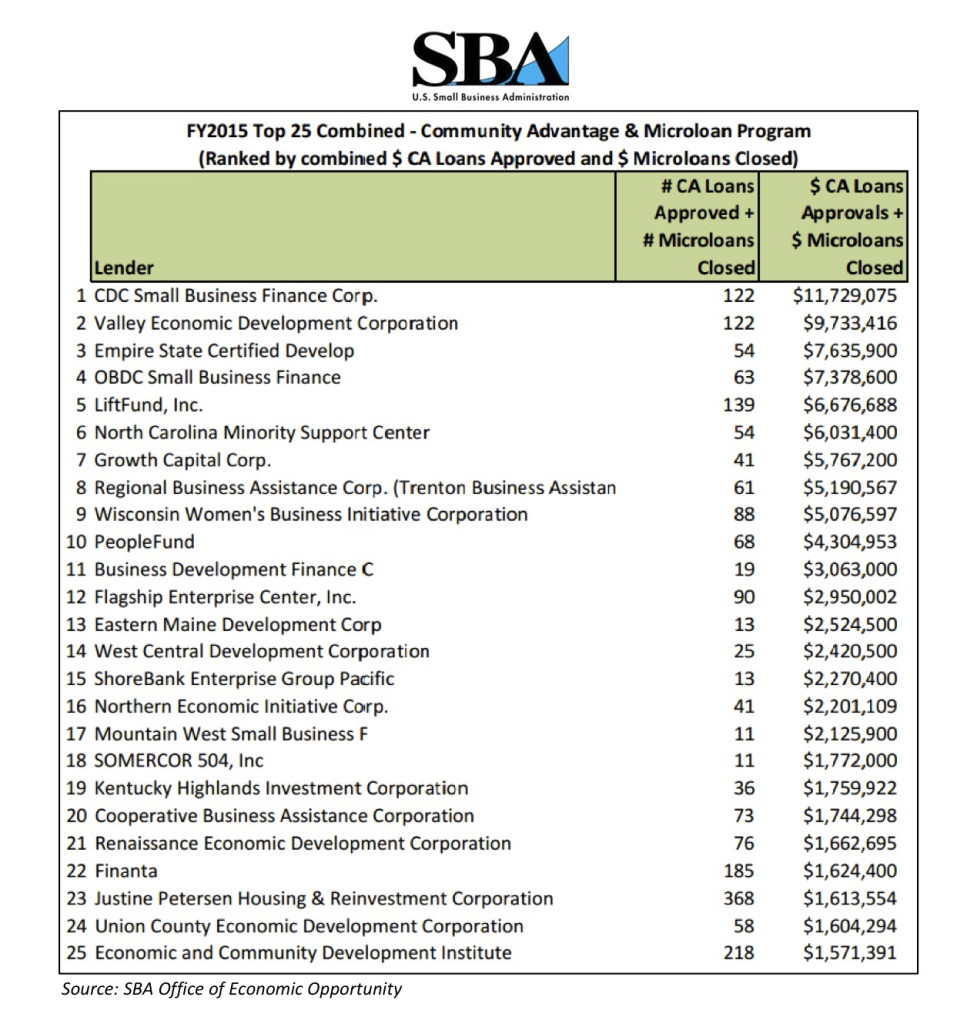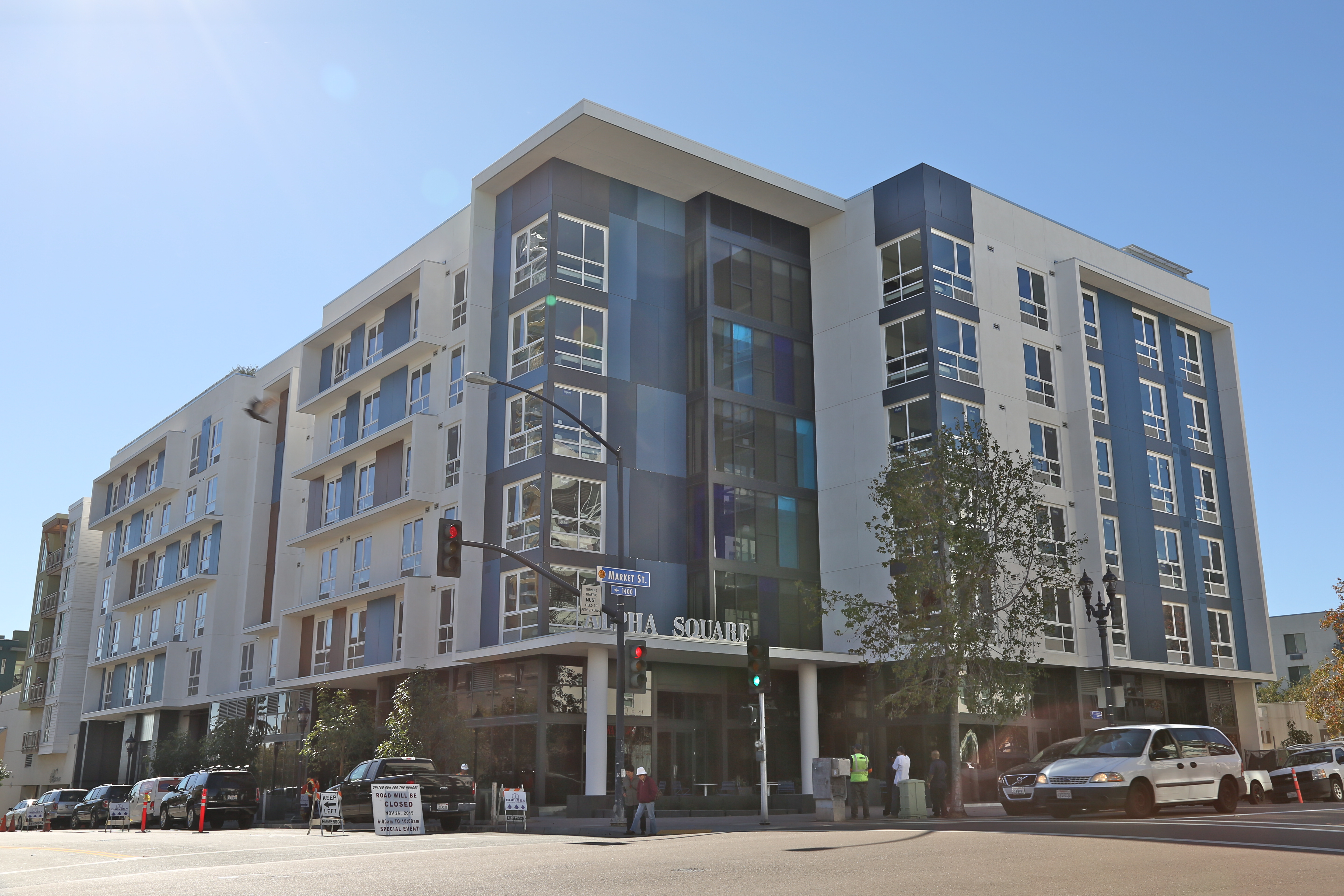Daily Business Report-Nov. 19, 2015
The Alpha Square Apartments in Downtown’s East Village contain 201 units.
San Diego’s Newest Affordable
Housing Complex Opens Downtown
Formerly homeless and low-income individuals started moving into the new Alpha Square Apartments on Wednesday, where they will live in more spacious studio apartments with their own private bathrooms, putting an end to the days at the Hotel Metro when they had to go down the hallways to use the bathroom facilities.
Close to a hundred people attended thegrand opening ceremony, which was held on the rooftop of Alpha Square, located at Market and 14th streets.
“We wanted something that did not look like an affordable housing building,” said Bob McElroy the president & CEO of Alpha Project for the Homeless, which co-developed Alpha Square with Chelsea Investment Corporation. “I think when you walk the place you would never know this is a low-income housing project and it doesn’t have to be – our people deserve better than that.”
The 201 studios are more than double the space of the previous units at the 25-year-old single room occupancy hotel and are furnished and equipped with cooktops and air conditioning. Alpha Project will provide supportive services for tenants at Alpha Square.
Alpha Square will remain affordable for 55 years. It was also developed in partnership with the San Diego Housing Commission, the city of San Diego and Civic San Diego.
Alpha Square is a six-story, transit-oriented mixed-use $47.6 million development with retail space at the street level.
The development was 10 years in the making, which included a study that concluded that the aging Hotel Metro needed to be torn down.
The city of San Diego provided a $17.6 million loan for the construction of Alpha Square and owns the land, which is subject to a 70-year ground lease.
SDHC also authorized the issuance of more than $6.2 million in State multifamily housing revenue bonds to assist with construction financing for Alpha Square. The San Diego City Council, sitting as the Housing Authority of the City of San Diego, approved the bonds.
SDHC also awarded 135 federal rental housing vouchers, which will allow very low-income tenants to pay up to 30 percent of their income toward their rent. These SDHC housing vouchers have an annual value of more than $1.4 million.
_______________________________________
CDC Small Business Finance
Named a Top Lender by SBA
CDC Small Business Finance, a nonprofit based in San Diego, has been recognized as the nation’s top Community Advantage/Microloan program lender for 2015, providing over $11 million in capital to small businesses, according to the Small Business Administration.
SBA’s Office of Economic Opportunity said 93 startups and other small businesses received $10.7 million in Community Advantage loans and 29 businesses received $963,000. CDC projects that over 900 jobs will be created and retained by the funded small businesses.
Community Advantage loans range from $20,000 to $250,000 and microloan funding ranges up to $50,000.
“Small businesses are the backbone of our economy, the force behind job creation and economic development,” said Kurt Chilcott, president of CDC Small Business Finance, which also leads the nation in SBA-504 loans, which help entrepreneurs buy their own commercial/industrial building. “We look forward to putting more dollars in the hands of growing small businesses in 2016.”
The Community Advantage loan program was created in 2011 to increase the flow of capital to small businesses in underserved communities.

_______________________________________

General Atomics’ Gray Eagle
Completes Teaming Exercises
General Atomics Aeronautical Systems Inc. reported that a U.S. Army Gray Eagle Unmanned Aircraft System recently conducted manned-unmanned teaming exercises in South Korea. Exercise support was conducted in August 2015 from Kunsan Air Base, South Korea.
“These flights represent a major milestone for the MQ-1C Gray Eagle as they successfully demonstrated manned-unmanned teaming in South Korea and proved the aircraft’s ability to conduct operations in diverse weather conditions that are typical on the Korean Peninsula,” said Frank W. Pace, president of Aircraft Systems. “They also marked a new company milestone for Gray Eagle with its first mission in South Korean airspace.”
During the exercise, the Gray Eagle UAS streamed video and metadata via a line-of-sight data link directly to a U.S. Army AH-64 Apache helicopter from extended distances. The Apache subsequently was able to re-transmit the imagery to a One System Remote Video Terminal, allowing ground forces to view the video from the helicopter. Field commanders within the Tactical Operations Center were able to receive both live Gray Eagle streaming video and re-transmitted video sent by the Apache.
Once Gray Eagle was airborne, U.S. ground forces passed contact reports and target coordinates to operators in the aircraft’s One System Ground Control Station (OSGCS). The operators were then able to direct the Gray Eagle’s sensors to positively identify and track the targets.
Regional Water Use Drops
19 Percent in October
Urban potable water use in the San Diego region decreased by 19 percent in October compared to October 2013 despite record-setting heat, according to preliminary data released by the San Diego County Water Authority. It was the fifth consecutive month of major regional water-use reductions since state mandates started in June.
From June through October, regional water consumption dropped by 26 percent compared to the state’s baseline period in 2013, beating the regional aggregate target of 20 percent.
High temperatures made water conservation more challenging in October. Temperatures at Lindbergh Field were about 8 degrees above average for the month; in October 2013, temperatures at Lindbergh Field were slightly below normal. Current projections are for temperatures to remain above average statewide during the fall and winter, likely making it harder to conserve water and making it harder to accumulate snowpack.
Illumina Partners with iHART to
Provide Autism Data on BaseSpace
GenomeWeb
San Diego-based Illumina said it is partnering with researchers involved in the Hartwell Autism Research and Technology Initiative (iHART) to establish an open-access repository of bioinformatic data on autism spectrum disorders on BaseSpace.
Specifically, Illumina will host 5,000 genomes of individuals with autism and their families from the National Institute of Mental Health genetics repository in BaseSpace, where researchers can access and analyze it. In addition, researchers will also have access to resources such as Amazon RedShift, a petabyte-scale data warehouse that offers tools for analyzing, storing, and exploring genomic data across large populations on BaseSpace.
IHART is a collaborative research effort involving Stanford University, the New York Genome Center, and the University of California, Los Angeles that is funded by a $9 million grant from the Hartwell Foundation with additional support from the Simons Foundation. The platform will also feature a user-friendly portal through which researchers, family members, and other interested individuals will be able to access the data.
The iHART initiative is led by Dennis Wall, an associate professor of systems medicine in Stanford’s pediatrics department and principal investigator on the project; and Dan Geschwind, a UCLA professor of neurology, psychiatry, and human genetics and director of UCLA’s Center for Autism Research and Treatment.

County Supervisors Look at Incentive
Zones To Grow Urban Farms
The San Diego County Board of Supervisors planted a seed Wednesday that could one day help turn empty lots throughout the region into small farms — by directing county staff to look into creating urban agriculture incentive zones.
The county staff is to create criteria to evaluate proposals to establish urban agriculture zones in both the unincorporated county and cities — and report that criteria within 90 days to the board and all 18 cities in the county. It is also to determine if an urban agriculture zone would work in the unincorporated area of the county.
A 2013 state law allows counties and cities to establish urban agriculture enterprise zones. The zones were intended to give gardens and small farms the chance to sprout up even in urban neighborhoods by letting local governments give tax breaks to property owners willing to let their vacant land be used for farming and agricultural use.
County Supervisors Ron Roberts and Dianne Jacob brought the urban agriculture zone issue to the board for consideration Wednesday.
Roberts said the zones could create community gardens that could provide communities with several benefits: new sources of locally-grown, healthy food; informative places to learn more about food; and potentially, ways to turn blighted lots in neighborhoods into safer, cleaner places.
Court Upholds City’s
Taxicab Deregulation
A Superior Court judge on Wednesday upheld the City Council’s November 2014 actions to deregulate the San Diego taxicab industry by lifting a cap on the number of tax permits, or medallions, issued by the Metropolitan Transit System.
The amended taxicab ordinance, which has already resulted in 101 new taxi permits being issued, was challenged by the San Diego Transportation Association, a group of permit holders.
Under the previous system, medallions were being sold in private transactions for tens of thousands of dollars — far more than their original value. Many were owned by individuals who no longer drove taxis themselves, but instead leased the vehicles to immigrant drivers.
In its lawsuit, the SDTA argued that the Metropolitan Transit System violated the California Environmental Quality Act by not conducting an environmental review before issuing new taxi permits. It also claimed the City’s action was arbitrary and capricious and an abuse of discretion.
The City Attorney’s Office, which represented MTS in court, argued that the ordinance was not a “project” under CEQA and that its impact on the environment was likely a positive one, as the ordinance requires newly permitted drivers to use low-emission vehicles.
Judge Gregory W. Pollack ruled in favor of the city and MTS. He said
that the SDTA “failed to cite any authority holding that taxicab regulations constitute a (CEQA) project as a matter of law” and that SDTA “failed to present evidence of adverse environmental impacts.”

County Parks to Expand
By Nearly 100 Acres
Nearly 100 acres of land will soon be added to county parks. The county Board of Supervisors voted Wednesday to approve the purchase of 39.25 acres for Sycamore Canyon/Goodan Ranch Preserve and 60.31 acres of land for the planned San Luis Rey River Park in Bonsall.
The land for the preserve is located near Poway west of State route 67 and south of Scripps Poway Parkway. The $541,000 property will be used for open space and will preserve chaparral and coastal sage scrub habitat. County Parks will also see if the land could provide a link to the Trans County Trail which runs across several jurisdictions to the coastal area.
The other parcel of land is located north of Camino del Rey and east of state Route 76. The land will cost about $3.1 million and become part of San Luis Rey River Park. That project involves a long-range plan to create a regional 1700-acre park that will run nearly nine miles in length along the San Luis Rey River from Oceanside to Interstate 15. Most of it will be left as open space but the park will also offer about 20 miles of trails. No date has been set for an opening.
Qualcomm Shares Off 9 Percent
On South Korean Licensing Probe
Times of San Diego
Shares of Qualcomm fell more than 9 percent on Wall Street following news that South Korean authorities are investigating the wireless communications company’s lucrative patent-licensing business.
The company’s stock closed at $48 in New York on Wednesday, down $4.98 or 9.4 percent from it’s Tuesday close of $52.98. Its now trading barely above its 52-week low of $47.52.
Late Tuesday, Qualcomm confirmed the investigation by the Korea Fair Trade Commission, but said the allegations were “not supported by the facts and are a serious misapplication of law.” The company said it would “vigorously defend” itself.
“Our patent licensing practices, which we and other patent owners have maintained for almost two decades, and which have facilitated the growth of the mobile communications industry in Korea and elsewhere, are lawful and pro-competitive,” Qualcomm said.
Qualcomm said the Korean commission’s staff-generated “Case Examiner’s Report” begins a process under which Qualcomm can respond to the allegations and defend itself.
The company has battled antitrust cases in multiple countries, notably China, where it recently reached a settlement.
City Revenues Projected to ‘Modestly Improve’
Revenues to the city of San Diego are projected to “modestly improve” over the next five fiscal years, while expenses will continue to rise, according to a financial outlook to be delivered Thursday to the City Council’s Budger Committee. The five-year outlook, released annually in November by the mayor’s financial staff, projects steadily increasing general fund surpluses through Fiscal Year 2021. The general fund pays for basic services like public safety, parks and libraries. Times of San Diego
Ronald McDonald House Charities
Gets $56,500 from 3 Foundations
The Ellen Browning Scripps Foundation, the Farrell Family Foundation and the Parker Foundation are granting a total of $56,500 to Ronald McDonald House Charities of San Diego to help provide 150,000 free meals for families caring for critically ill or injured children at local hospitals.
Meals at San Diego’s Ronald McDonald House give weary families a convenient way to get the nourishment they need while remaining close to the hospital. Meals are free to families, thanks to generous donations of food from local retailers, as well as more than 300 volunteer groups who provide meals each year.
Grants from The Ellen Browning Scripps Foundation and Farrell Family Foundation are providing core support to fund what is not donated — extra food, equipment and staff oversight needed to serve 450 meals daily.
“Meals are a fundamental need for us all, but it’s something that parents forget about when they are focused on a critically ill or injured child. Having free, hot meals in a caring environment makes it easier for families to take care of themselves,” said Mick Farrell, ResMed CEO and board member of the Farrell Family Foundation. “They can go back to the hospital with renewed spirits and strength for their child.”
The Parker Foundation has joined in support of the meals program this year, with a $24,000 grant to streamline and “green” its operations. This includes new dishwashers and recycling efforts, including food waste recycling. By eliminating paper plates and diverting recyclable items, the Ronald McDonald House has reduced its trash output from 38 bags to just three bags a day.




